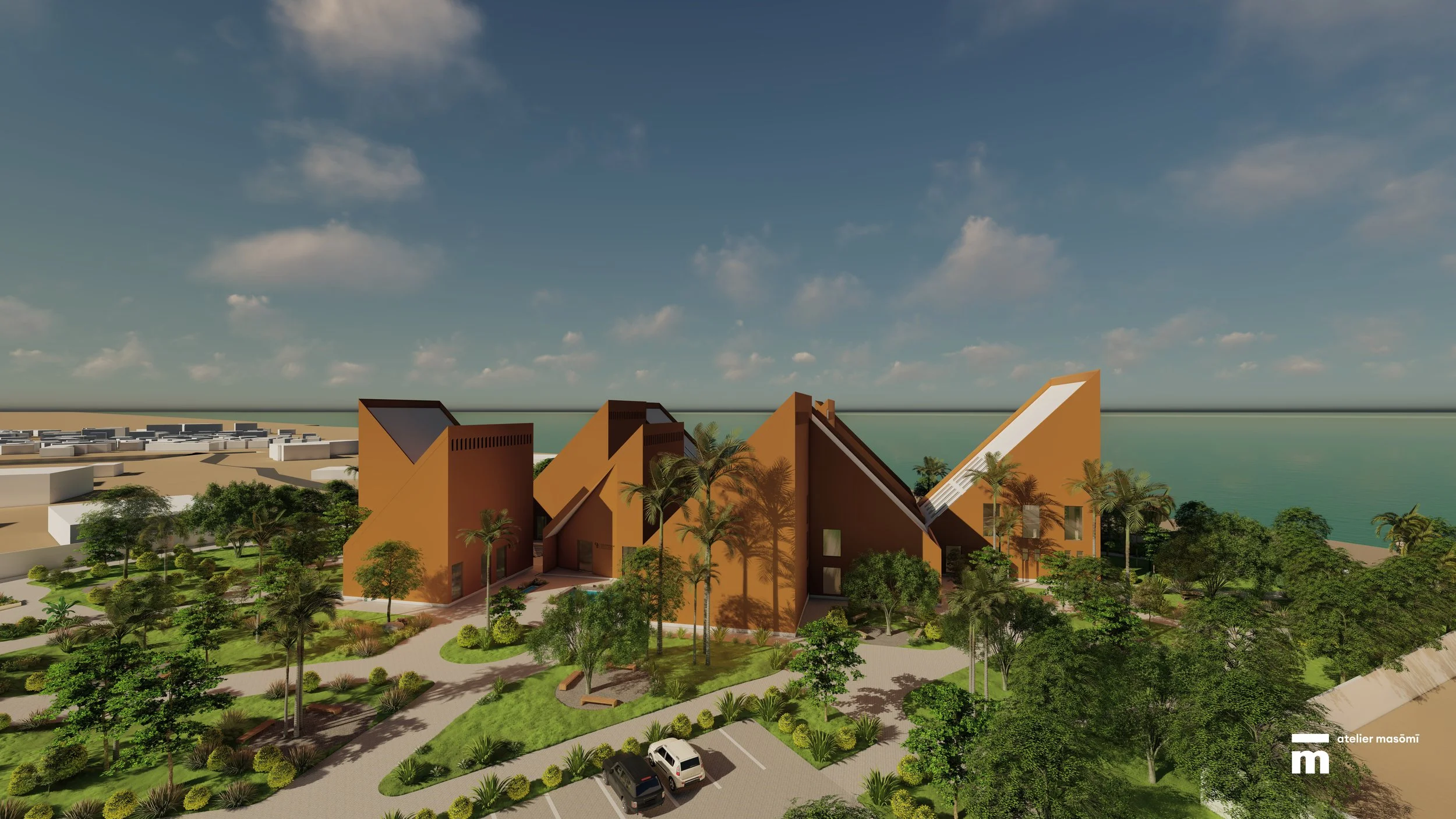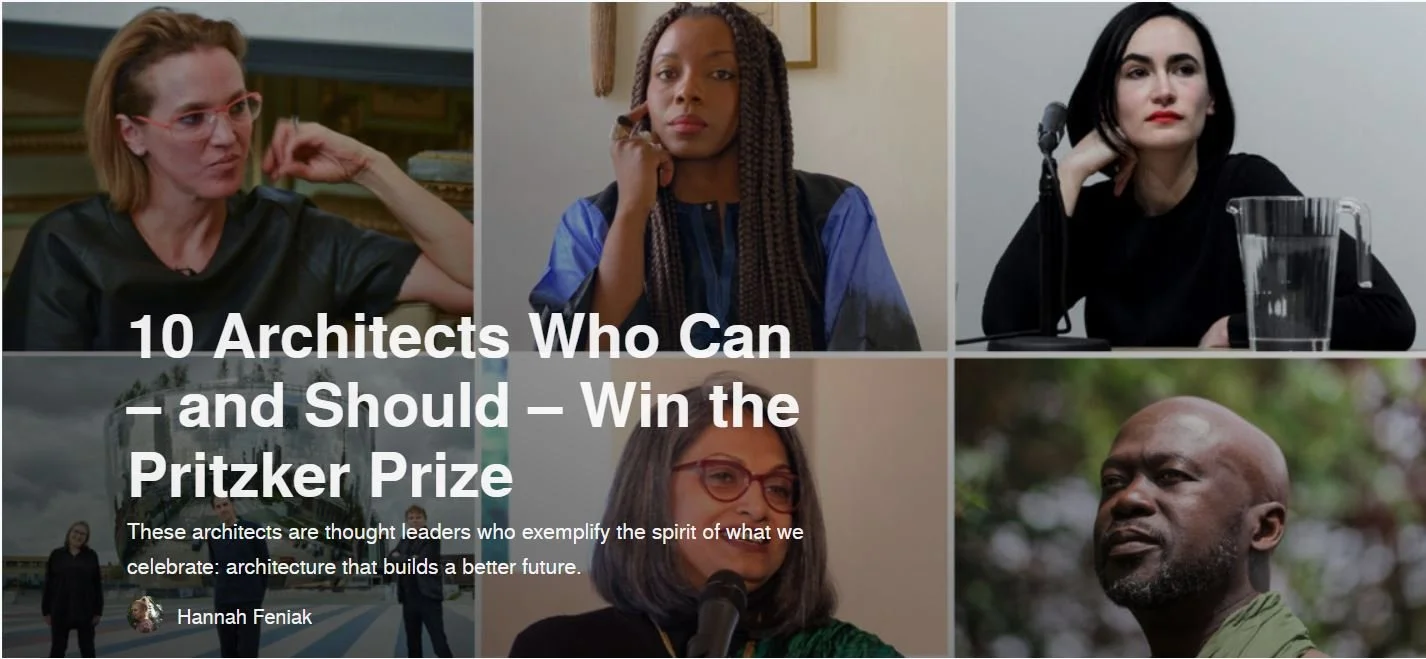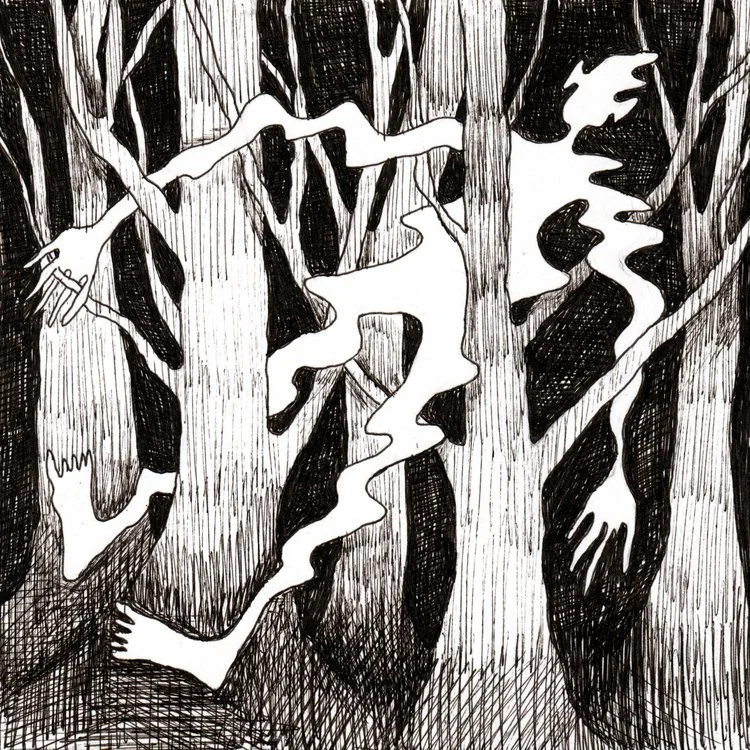141. The Faada-Adda Conversations
Original Drawing by Tori Haynes
The Faada-Adda Conversations conversations between Vikram Prakash and Mariam Issoufou Kamara.
In the latest episode of these ongoing conversations, Vikram and Mariam are joined by AbdouMaliq Simone, in a conversation about hangout spaces in the Global South as well as the future of what these spaces would look like with urban inhabitation.
Listen to the episode.
Press release: Design reveal for the Ellen Johnson Sirleaf Presidential Center for Women and Development
atelier masōmī is pleased to share the design for the Ellen Johnson Sirleaf Presidential Center for Women and Development (EJS Center).
Mariam Issoufou Architects (formerly atelier masōmī) is pleased to share the design for the Ellen Johnson Sirleaf Presidential Center for Women and Development (EJS Center). The EJS Center, which will be located in Liberia’s capital of Monrovia, will provide digital access to former President Ellen Johnson Sirleaf’s personal and professional archives. The complex will consist of offices for the EJS Center team, conference rooms, exhibition areas, a café, library and workshop spaces. President Ellen Johnson Sirleaf selected an all-woman team to work on the project with atelier masōmī’s Mariam Issoufou Kamara as the lead architect directing the building design, Sumayya Vally of Counterspace as the exhibitions architect, and Liberian architect Karen Richards Barnes as the local architect.
Mariam Issoufou’s design took its inspiration from Liberia’s architectural heritage, paying close attention to the traditional palava huts. Their originally tall, exaggerated pitch roofs were a direct response to the local climate as a mechanism for managing Liberia’s heavy rainfalls. The ceilings inside these dwellings featured beautiful yet functional woven designs. Grouped together, as they were in rural settings, the collection of huts would look visually striking and embody a sense of community. The huts served as an important reference in the design of the EJS Center complex, reimagined for a civic purpose. The resulting buildings have similar exaggerated slanted roofs, which also help with natural ventilation, allowing the heat and moisture to escape through the roof.
Early sketches of the Ellen Johnson Sirleaf Presidential Center by Mariam Issoufou Kamara
Mariam Issoufou Kamara said: “The design is a direct response to the history, climate, cultural and architectural heritage of Liberia. The project is an introspection on the challenges faced and on the strength and hope brought about by inspirational leaders such as Madam Sirleaf. The first woman Head of State on the continent, her ability to bring communities together, and be supported by those communities in return, particularly women, was an important component of the conceptual vision of the project. The objective was to design a building that captured the sense of humility, service to a people, grounded in cultural authenticity and great vision that symbolizes Madam Sirleaf’s work.”
The project will use local materials such as raw earth bricks, fired clay bricks, rubber wood and woven palm leaves in abundance. This strategy sets the stage for incorporating local builders, manufacturers and craftswomen in the project to help promote economic sustainability. Rather than importing materials and skills, the construction of the EJS Center will be a process of building a contemporary, state of the art complex in direct partnership with the people of Monrovia. Liberia is a green and lush country, which inspired a complex with ample green spaces. The vegetation not only beautifies the surroundings with indigenous plants but also aids in the management of storm-water. The project’s collection of buildings is aerated by courtyards that serve as additional spaces for gathering and workshop programs. Its series of exhibition rooms currently being designed by Vally are complemented by community amenities that allow for conferences, workshops, as well as access to a library and learning center.
The project’s collection of buildings is aerated by courtyards that serve as additional spaces for gathering and workshop programs.
The café overlooking the ocean opens up on a large plaza amenable to functions and community celebrations. The project is sustainable at its core, developing a series of simple strategies for minimizing energy consumption and material waste. The design maximizes natural light over artificial lighting, through the addition of abundant skylights and windows, which helps to circumvent Monrovia's lengthy electricity shortages. Opportunities for natural ventilation keep the interiors cooler in the hotter months and provide a lower reliance on artificial cooling. This effort in lowering energy consumption will be enhanced by the use of solar panels to provide a sizable portion of the electricity for the Center’s day-to-day operations. The result will be a place that serves as a beacon in the world and aims to energize and instill a sense of self-pride and optimism in its visitors, particularly Liberians.
END
Note to Editors
About the EJS Center for women and development:
The EJS Center was founded in 2018 to be a catalyst for change across Africa by helping unleash its most abundant untapped power—its women. It officially launched on International Women’s Day, March 8, 2020. Through a unique blend of programming, advocacy, research, and exhibitions, the Center advances women’s public leadership and social development on the continent. As the first democratically elected woman president in Africa, Nobel Peace Prize winner Ellen Johnson Sirleaf is passionate about supporting the next generation of women in public leadership.
About Mariam Issoufou Kamara
Mariam Issoufou Kamara is an architect from Niger who studied architecture at the University of Washington. In 2014, she founded atelier masōmī, an architecture and research practice that tackles public, cultural, residential, commercial and urban design projects. The firm’s headquarters are in Niamey, with a smaller office handling design projects in New York. Kamara believes that architects have an important role to play in creating spaces that elevate, give dignity, and provide people with a better quality of life. The firm’s award-winning projects include the Hikma Community Complex, Niamey 2000 Housing and the Dandaji Regional Market. Upcoming projects include the Yantala Office and the Niamey Cultural Centre. Kamara is a professor of Architecture Heritage and Sustainability at ETH Zurich. The New York Times named her as one of 15 Creative Women of Our Time. The firm has been on the AD100 list since 2021.
For press information about atelier masōmī, please contact:
Neo Maditla
Communications lead | atelier masōmī
E. neo@ateliermasomi.com
For press information about the EJS Center, please contact:
Christopher Ifeanyi-Nwanze
Director of Communication & Research | EJS Center
E. cinwanze@ejscenter.org
10 Architects Who Can – and Should – Win the Pritzker Prize
Architizer profiled ten architects, including Mariam Issoufou, who can - and should - win the Pritzker Prize.
According to Architizer, Mariam Issoufou Kamara is among 10 architects who exemplify the spirit of an architecture that builds a better future. Read more.
6 Female Architects Advocating for Sustainability in Design
Mariam Issoufou Kamara was featured in this Cultured magazine article focussing on the work of women architects who advocate for sustainability.
135. The Faada-Adda Conversations
Original Drawing by Tori Haynes
The Faada-Adda Conversations between Vikram Prakash and Mariam Issoufou Kamara
In the latest episode called Future Hériter, Vikram and Mariam talk about breaking free from the boundaries of the cardinal directions and getting into new ways of being.
Listen to the episode.
Go West feature in Wallpaper Jan, 2023
atelier masōmī is part of Wallpaper’s series on architects, spatial designers and builders shaping West Africa's architectural future.
Afrique magazine interviews Mariam Issoufou Kamara
Afrique Magazine interviews Mariam Issoufou Kamara on the importance of architecture that serves more than oneself.
Platform Architecture Magazine November Cover
Mariam Issoufou Kamara featured on the cover of Platform Architecture Magazine in Italy. The issue focussed on the importance of Listening in architecture.
Colours of Africa
Mariam Issoufou Kamara is one of 60 African artists selected by Design Indaba and Google Arts & Culture to take part in the Colours of Africa online exhibition.
Z-axis: Form Follows Climate Conference 2022
Mariam Issoufou Kamara will be a speaker at the 5th edition of Z-axis conference. This year, the conference addresses the urgency of climate responsive architecture.
Landmarks by African architects
These are the buildings by African architects that are changing Africa's architectural landscape.
These are the buildings that are changing Africa's architectural landscape.
Dazed Magazine: From the Ground Up
Mariam Issoufou Kamara featured in the September ‘Age of Imagination’ issue of Dazed Magazine.
Mariam Issoufou Kamara was featured in the Age of Imagination issue of Dazed Magazine which came out in September 2022.
Azure Magazine interviews Mariam Issoufou Kamara
Mariam Issoufou Kamara talks new projects with Azure Magazine.
Stilwerk Magazine: The African Way
We’re featured in Stilwerk Magazine in an article highlighting the work of contemporary African architects.
We’re featured in Stilwerk Magazine in an article highlighting the work of contemporary African architects.
Le Monde Afrique: Building for Africa
Mariam Issoufou Kamara talks to Christophe Châtelot about architecture, Niameys colonial history and our latest projects.
In the latest issue of Le Monde Afrique, Mariam Issoufou Kamara talks to Christophe Châtelot about architecture and Niamey’s colonial history.
Mariam Issoufou Kamara appointed full professor at ETH Zurich.
We're proud to announce that Mariam Issoufou Kamara has been appointed as Full Professor of Architecture Heritage and Sustainability at ETH Zurich.
Sharjah Architecture Triennial curatorial advisory board
Sharjah Architecture Triennial 2023 curator Tosin Oshinowo has selected Mariam Issoufou Kamara as one of six members of the curatorial advisory board.

























